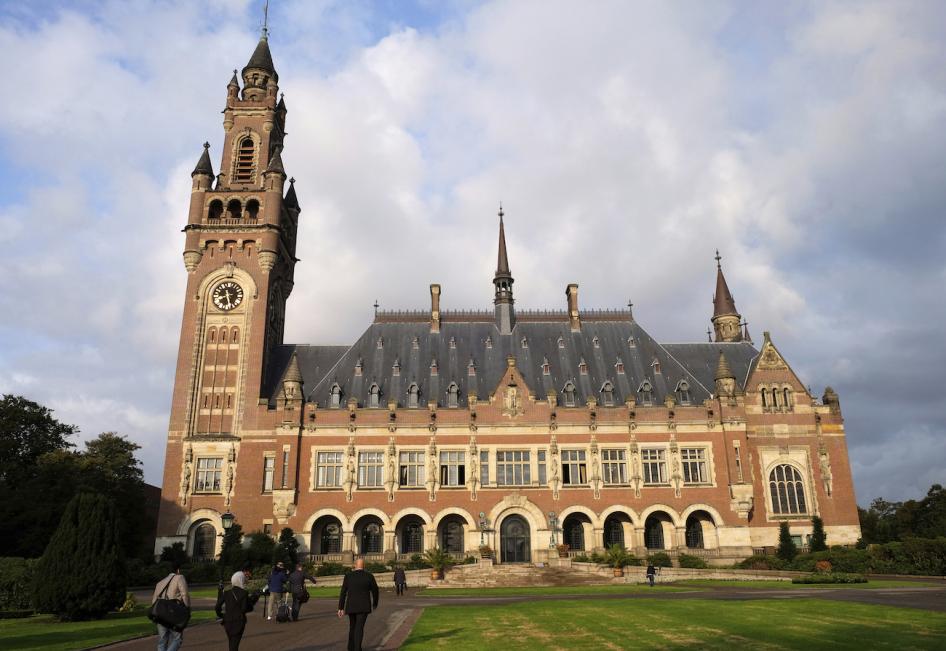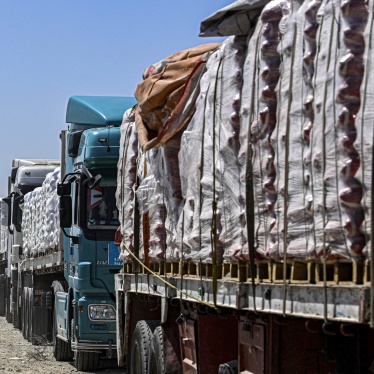(The Hague) – The International Court of Justice (ICJ) is set to issue an advisory opinion on July 19, 2024, with significant consequences for human rights protections in Palestine under Israel’s 57-year occupation, Human Rights Watch said today. The expected advisory opinion stems from a December 2022 request by the United Nations General Assembly to the court to consider the legal consequences of Israel’s policies and practices in the Occupied Palestinian Territory.
The ICJ held hearings on Israel’s occupation over six days in February. Fifty countries and three international organizations participated in the oral proceedings, more than in any other case since the world’s highest court began functioning in 1946, based on Human Rights Watch analysis.
“The World Court’s opinion will be its first comprehensive assessment of the human rights consequences for Palestinians of Israel’s occupation policies and practices,” said Clive Baldwin, senior legal adviser at Human Rights Watch. “The court’s recommendations could shed light on the root causes underlying the current devastating atrocities and open the door to redress the flagrant harms committed by Israeli authorities with impunity over the past six decades.”
The court has a broad remit in what it can cover in its advisory opinion based on the request from the UN General Assembly. It may address a range of issues from Israel’s practices and policies violating international legal prohibitions against racial discrimination, including the crime against humanity of apartheid, to the continued application of international humanitarian law and human rights law under occupation.
The court may also assess the legal responsibilities of other countries and the UN to address violations of international law arising from Israel’s occupation. States should adopt the ICJ’s recommendations to guide their efforts to end violations of international humanitarian and human rights law against the Palestinians, Human Rights Watch said.
Israel, which rejects the applicability of the law of occupation to Palestine, unlawfully purported to annex occupied East Jerusalem in 1967, and in 2023 transferred key elements of its control over the West Bank from military to civilian authorities. It also refuses to acknowledge its responsibilities toward Palestinian civilians as the occupying power in the Gaza Strip. However, it remains, legally, the occupying power in Gaza and the West Bank, including East Jerusalem, with legal duties toward the civilian population in all the Occupied Palestinian Territory.
The ICJ’s consideration of the legal consequences of Israel’s occupation policies and practices began in December 2022 and so predates the October 2023 escalation of hostilities between Israel and Palestinian armed groups. On October 7, 2023, Hamas-led Palestinian armed groups carried out an assault on southern Israel and took 251 people hostage, committing war crimes and crimes against humanity and have continued to launch indiscriminate rockets at population centers. Israeli forces have unlawfully attacked residential buildings, medical facilities, and aid workers, restricted medical evacuations, blocked humanitarian aid, and used starvation as a weapon of war in the Gaza Strip, which has suffered a staggering toll of over 38,600 people killed according to the Gaza Health Ministry. Israeli authorities have detained incommunicado and mistreated thousands of Palestinians, with persistent reports of torture.
In the occupied West Bank, where Israeli forces have killed over 530 Palestinians since October 7, settlers and soldiers have displaced entire Palestinian communities, destroying every home, with the apparent backing of higher Israeli authorities and effectively confiscating their lands.
The World Court’s advisory opinion is expected to focus on the legal consequences of the occupation, rather than specifically assessing the conduct of Israeli forces and Palestinian armed groups during the recent hostilities. However, abuses and violations by all parties since October have taken place in the context of the occupation and the acceleration by Israeli authorities of illegal settlement expansion, as well as the ongoing commission of the crimes against humanity of apartheid and persecution against Palestinians. In submissions to the court, 25 countries cited the commission of the crimes against humanity of apartheid or persecution by Israel against Palestinians as one key consequence of the occupation.
The ICJ adjudicates disputes between states and issues advisory opinions on international law. It lacks jurisdiction over the conduct of non-state armed groups like Hamas. Although ICJ advisory opinions are nonbinding, they can carry great moral and legal authority and can ultimately become part of customary international law, which is legally binding on states. The last advisory opinion by the ICJ, in 2019, addressed the deportation of the inhabitants of the Chagos Archipelago by the United Kingdom and the decolonization of Mauritius.
The United Nations General Assembly could convene a discussion on the opinion. By an overwhelming majority, it voted in 2004 to require Israel to abide by a July 2004 ICJ advisory opinion finding that the route of Israel’s separation barrier violated international law and that it should be dismantled.
The proceeding is separate from the case brought at the court by South Africa, alleging that Israel is violating the Genocide Convention. While a ruling on the merits of that claim will most likely take years, the ICJ has three times ordered Israel to take certain measures, including enabling the provision of basic services and humanitarian assistance into Gaza. Human Rights Watch research demonstrates that Israel is continuing to flout the court’s orders, with devastating consequences for Palestinians in Gaza.
This ICJ proceeding is also distinct from proceedings before the International Criminal Court (ICC), which has a mandate to assess the criminal responsibility of individuals. On May 20, the ICC prosecutor, Karim Khan, announced that he was seeking arrest warrants against two senior Israeli officials and three Hamas leaders. Khan confirmed that his office is conducting an investigation since March 2021 into atrocity crimes committed in Gaza and the West Bank, including East Jerusalem, since 2014, and that his office has jurisdiction over crimes in the current hostilities between Israel and Palestinian armed groups that covers unlawful conduct by all parties.
Given that the responsibilities of an occupying power toward the rights of the occupied population increase over time, Human Rights Watch has also called for Israel to provide Palestinians in the occupied territory with rights at least equal to those it grants its own citizens, in addition to the protections of international humanitarian law.
The ICJ is composed of 15 judges elected by the UN General Assembly and Security Council for nine-year terms. Fifty-seven states and international organizations had filed a written statement in the proceedings in July 2023. Fifteen states and international organizations filed additional written comments in October and November 2023. Israel submitted a written statement and chose not to participate in the oral hearings.
“The participation of so many states in the hearings leading up to the ruling demonstrates the importance of the issues before the World Court,” Baldwin said. “The opinion could provide a useful roadmap for states seeking to protect human rights and end years of impunity for human rights abuses in Israel and Palestine.”







